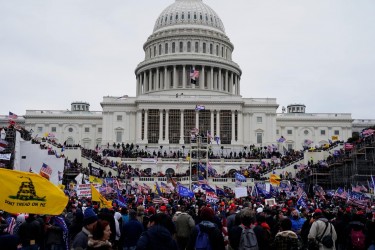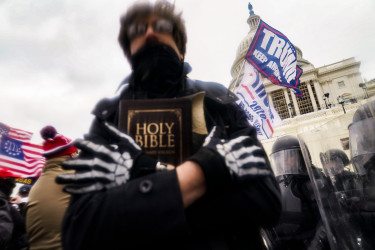“Big protest in D.C. on January 6th,” Donald Trump tweeted before Christmas. “Be there, will be wild!” On New Year’s Day, he tweeted again: “The BIG Protest Rally in Washington, D.C. will take place at 11:00 A.M. on January 6th.” On January 5th: “I will be speaking at the SAVE AMERICA RALLY tomorrow on the Ellipse at 11AM Eastern. Arrive early—doors open at 7AM Eastern. BIG CROWDS!” The posters called it the “Save America March.” What happened that day was big, and it was wild. If it began as a protest and a rally and a march, it ended as something altogether different. But what? Sedition, treason, a failed revolution, an attempted coup? And what will it be called, looking back? A day of anarchy? The end of America?
Trump called the people who violently attacked and briefly seized the U.S. Capitol building in order to overturn a Presidential election “patriots”; President-elect Joe Biden called them “terrorists.” In a section of “Leviathan” called “Inconstant Names,” Thomas Hobbes, in 1651, remarked that the names of things are variable, “For one man calleth Wisdome, what another calleth Feare; and one Cruelty, what another Justice.” On the other hand, sometimes one man is right (those people were terrorists). And, sometimes, what to call a thing seems plain. “This is what the President has caused today, this insurrection,” Mitt Romney, fleeing the Senate chamber, told a Times reporter.
By any reasonable definition of the word (including the Oxford English Dictionary’s: “The action of rising in arms or open resistance against established authority”), what happened on January 6th was an insurrection. An insurrection is, generally, damnable: calling a political action an insurrection is a way of denouncing what its participants mean to be a revolution. “There hath been in Rome strange insurrections,” Shakespeare wrote, in “Coriolanus.” “The people against the senators, patricians, and nobles.” Insurrection, in Shakespeare, is “foul,” “base and bloody.” In the United States, the language of insurrection has a vexed racial history. “Insurrection” was the term favored by slaveowners for the political actions taken by people held in human bondage seeking their freedom. Thomas Jefferson, in the Declaration of Independence, charged the king with having “excited domestic insurrections amongst us.” The English lexicographer Samuel Johnson, an opponent of slavery, once offered a toast “To the next insurrection of the negroes in the West Indies.” And Benjamin Franklin, wryly objecting to Southern politicians’ conception of human beings as animals, offered this rule to tell the difference between them: “sheep will never make any insurrections.”
























